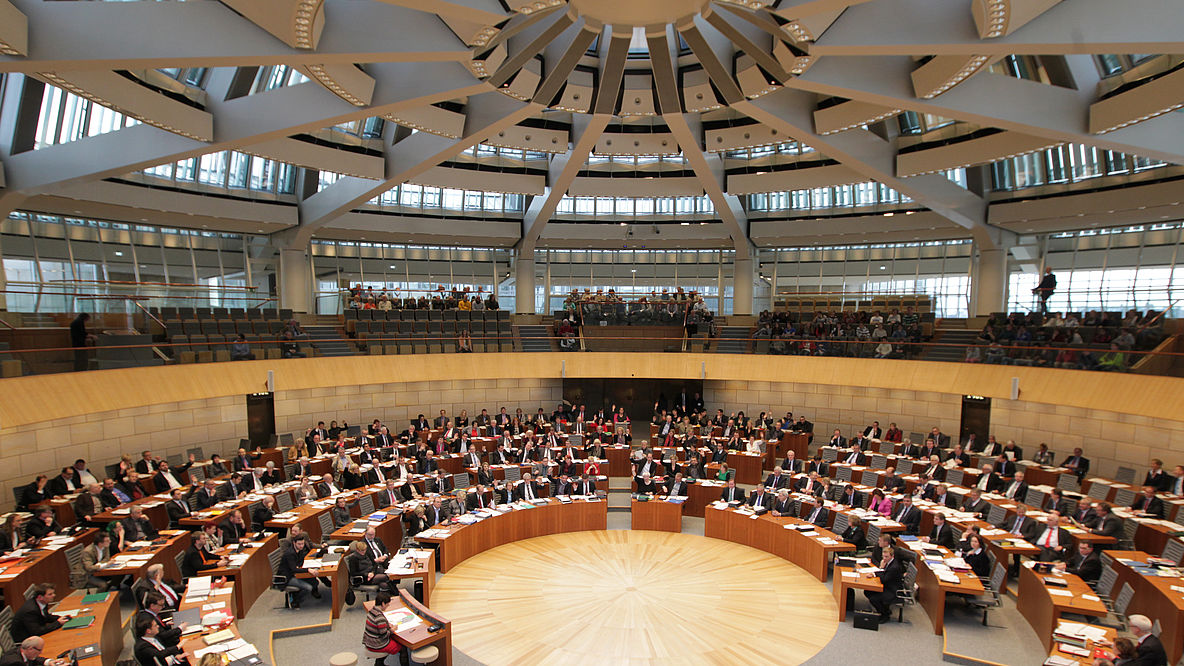Enquete Commission recommends citizens' assemblies

An Enquete Commission of the parliament of the German state of North Rhine-Westphalia recommends the increased use of randomly selected citizens' assemblies. On 18 May 2021, the commission "Subsidiarity and Participation" had presented 85 recommendations on the topics of local political volunteering, political participation, political education, digitalisation and on the cooperation of the state parliaments.
"Citizens' assemblies (...) have taken on an increasingly important role in the discussion on suitable instruments for strengthening democracy in recent years," states the report of the Commission. The citizens, who are selected at random, contribute to the clarification of political issues in close connection with politics and with the participation of experts. This would enable laypersons to make informed decisions.
Established participation formats with shortcomings
Democracy depends on participation. In particular, the educational background and the financial situation of citizens influence participation, but gender, age and migration experience also have an impact on participation. "Findings from participation research show that even the established formats of participation do not reach the entire population by a long shot," the report states in its introduction.
Whether consultative forms of participation counteract the social selectivity of participation and the underrepresentation of certain social groups depends largely on their design. A key role is played by the selection of participants. In order to ensure the greatest possible representativeness, random selection is a good idea. "In this way, different ideas and interests are more strongly taken into account and citizens who are underrepresented in other - parliamentary and direct-democratic - procedures can also participate in the process," the commission report emphasises.
Conditions for a representative image of society
In order to achieve a representative reflection of society, all factors that would otherwise hinder participation would have to be limited, for example by ensuring childcare, cost coverage, translations or sign language interpretation, as well as other inclusive measures.
The report goes on to say that "representative parliamentary, direct democratic and deliberative procedures are in a complementary relationship". If deliberative elements such as citizens' assemblies lead to a stronger representativeness and consensus orientation of parliamentary democracy, the probability of initiating a popular initiative against already decided or planned projects decreases. In this respect, it would be wrong to pit direct democracy and deliberative procedures against each other or both together against representative democracy.
Strengthening trust in democracy
"Instead, we should think about how they can be linked together as parallel strands of input legitimacy and brought into a sustainable balance in such a way that they strengthen trust in representative institutions and thus in democracy as a whole," the commission members suggest. In this context, federal states and municipalities would gain a key function due to their proximity to those affected and their task profile, which could at the same time serve as a model for democratic innovations at the federal and transnational levels.
"We have found that the desire for political participation continues unabated. Nevertheless, signs of a legitimacy crisis of representative democracy cannot be denied. They can be seen, for example, in the rise of populist parties that are hostile to the system, the expanding online public sphere with small-scale group interests and social inequality," says the chairperson, Dr. Stefan Nacke, at the presentation of the commission's report.
Discourse free of domination and values
According to the Enquete Commission deliberative procedures are characterised by the involvement of as large a part of civil society as possible in a discourse free of domination and values. Their goal is to help the "better arguments" prevail in a rational, reasoned discussion and thus bring about a broadly legitimised decision.
In contrast to direct democratic procedures, deliberative instruments are more dialogue-oriented and can be a constructive complement to parliamentary democracy. "They are not just about the decision itself, but about the best possible negotiation process and listening to and including different interests," the report says. Thematically, deliberative processes have proven their worth in infrastructure measures (especially at the municipal and state level). They are also suitable - as examples from abroad and isolated domestic projects have shown - for procedural questions and institutional policy issues.
Citizens assembly on citizens assemblies
As a consequence, the Enquete Commission recommends examining the extent to which (in a first step) a citizens' assembly at the state level can develop a concept for establishing and implementing deliberative procedures for municipalities and the state by testing various discussion formats with the scientific findings gained.
In 32 sessions, the Enquete Commission dealt with technical expertise through short scientific papers and presentations by expert members. In nine hearings and participation formats, more than 80 experts gave their opinions. In addition, the Commission had commissioned a scientific expert opinion.
Members of the commission
The Commission consisted of 13 members from all parliamentary parties and five expert members. The Chair of the Commission of Inquiry was Dr Stefan Nacke (CDU), the spokespersons of the parliamentary groups were Björn Franken (CDU), Professor Dr Rainer Bovermann (SPD), Angela Freimuth (FDP), Matthi Bolte-Richter (GRÜNE) and Roger Beckamp (AfD). The deputy chairperson was Ina Spanier-Oppermann (SPD). Dr Martin Florack, Professor Dr Frank Decker, Dr Raban Daniel Fuhrmann, Professor Dr Caja Thimm and Dr Georg Binzenbach were appointed as expert members.
About North Rhine-Westphalia
North Rhine-Westphalia is one of 16 federal states within the Federal Republic of Germany. With around 17.9 million inhabitants, it is the most populous state in Germany.
Read more: Enquete Commission "Subsidiarity and Participation"